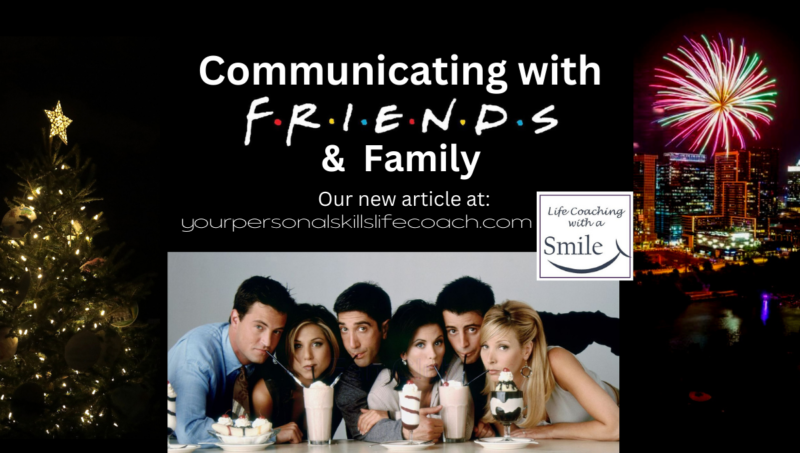Happiest of Holidays to you all. We celebrate Christmas at our house, so today starts the one-week countdown. My grandkids are brimming over with anticipation. I was wrapping gifts this week and I asked my daughter to “bring me more wrapping stuff.” She brought me a roll of wrapping paper. Then, with too much impatience, I said, “I have paper. I need more stuff to wrap,” She just looked at me and shook her head. I thought, “Why can’t she hear what I mean?” Today we discuss communication with those closest to us—how to talk to friends and family, the relationships we most often take for granted.
Communicating with Family & Friends Ain’t Easy
Communicating with family & friends, those we are closest to, those that have known us the longest should be the easiest. Sometimes that’s true, as when our spouses finish our sentences. When our best friends seem to know what we are thinking. But, I am all too often amazed when they don’t know what I’m thinking, or totally misunderstand what I’m saying. I sometimes I think they must be acting obtuse just to annoy me. Yes, that’s me putting the blame for the miscommunication on them. That is far from the truth.
“Dr. Boaz Keysar, of the University of Chicago, has spent a career studying interpersonal communication, and has found that communicating with people we know very well is actually more difficult than communicating with people we hardly know at all.” –mentalhelp.net
I have a degree in communication. I’ve been in the field of teaching and communication for 50 years, my husband and I were college debaters, teachers and trainers but at times we overestimate our ability to communicate effectively, especially with each other. Because we assume we are being understood, we don’t take the time to check whether we, our family and/or friends receive a clear message. So miscommunication ensues and if we don’t catch it, it can spiral.
Secondly, because we know our friends and relatives so well, we forget that they might not know everything that we know. So, they sometimes get lost in the middle of a conversation. When questioned, I have often said, “Oh, you know,” even though they just told me they didn’t know.
Communicating with Family & Friends Aint’ Just Talk
Communication involves much more than spoken words. Communication is also unspoken and written.
Body language carries a weight of its own. Teenagers are so proficient at this that we do them a great disservice to not observe what they, as well as others, are saying (or NOT saying) with body language.
We must take special care with what we write. We must remember to proofread. Our written mistakes may outlive us. (I shudder to think what future generations will think of these articles.) We must clearly write what we mean to say. “Time to eat, Grandma.” Not “Time to eat Grandma.”
Finally, remember for true communication to happen, the receiver must understand the message. When our intended message is subtle, sarcastic, ambiguous or an emotional, the frequently our intended meaning becomes unclear. The more subtle the message, the more likely the miscommunication. For example, if you say to your child or roommate, “Oh you didn’t take out the trash. Never mind I’ll do it.” Might there be some subtle sarcasm there that they just won’t get? If your message isn’t clear (as in the example above,) then the resulting miscommunication becomes your problem to remedy.
Turning Communication Weaknesses into Strengths
For most of us, nobody taught us ho to talk to friends and family. But, never fear; the following tips can help you become a better communicator:
Listen
Practice Active Listening aka Mindful Listening. Give your full attention to who is speaking. It will help insure you don’t miss what is being said. Active listening is the practice of listening to a speaker while providing feedback (verbal and nonverbal) indicating that you both hear and understand what the speaker is saying.
Don’t Assume
If you assume you know what they are saying, you will probably miss what they are actually saying. Listen and give feedback for clarification.
Don’t Interrupt
How do you feel when you are interrupted? Do you feel what you say doesn’t matter, that you don’t matter? Unless there is an emergency, don’t interrupt.
Stay In Control
When we discuss topics that are emotional or being driven by feelings we run a higher risk of misunderstanding and provoking anger. Be mindful and in control of your emotions. Use “I” statements. (e.g., “I felt angry”, not “You made me angry.”)
Effective communication addresses behavior not character.
Manage the Technology
Don’t let the tech manage you. So much of communication is technology based. (Maybe too much.) Texting and tweeting are not always the best way to communicate. When you have no reference for tone, attitude or other nonverbal clues it’s easy to misunderstand. When you suspect misunderstanding is brewing, ask clarifying questions. If the subject is important and difficult it may be best to talk by phone or, even better, face to face.
Be Direct
If you want to be understood, be direct. Subtlety may get your message lost and passive aggressiveness is aggregating. We can’t expect other people to read our minds.
Don’t Procrastinate
Don’t put off the hard conversation. Are you scared, worried, embarrassed? Use your feelings in the conversation. “I am worried about…” “I am embarrassed to tell you…”. Be clear about your message, practice it in advance if you need to. Putting it off will probably just make things worse.
Keep an Open Mind
Difficult conversations can polarize you and entrench you if you aren’t aware of your reactions and responses. Be prepared to modify or change your position. Don’t be quick to judge. Listen with an open mind, as you could be wrong or not aware of all the facts.
Ease on Down the Road
Don’t just END the conversation. Use a separation phrase. “It was nice to talk with you.” “I really enjoyed our discussion.” Try summarizing the discussion. Promise to talk more. Thank them for talking to you and end on a positive note. Even if you have to agree to disagree, acknowledge their time and effort.

Communicating with Family & Friends is Vital
Skillful communication can make good times better and keep bad times from getting worse. Communication problems are the number one issue in relationships.
Whether these relationships are family, friends, intimate or work-related, when communication fails the relationship fails. Whatever the problem, we can all benefit by recognizing our communication weaknesses and working to make them communication skills. We all must learn how to talk to friends and family.
“Communication works for those who work at it.” – John Powell
Related Articles:
* Please leave a comment below. You may comment anonymously or you may use your first name. We may post or quote your comment on the website. We will never post or share your last name, email address or any other personal identifying information.

